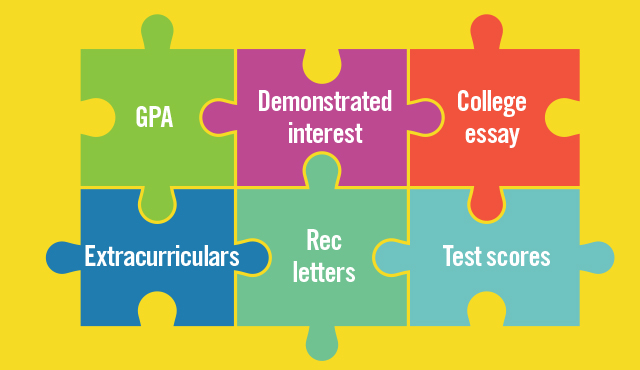Creating Equity in College Admissions: Ensuring Fairness in the Application Process. Looking for fairness in college admissions? Discover how To create equity in The application process, ensuring a level playing field for all students. Gain insights into strategies for a fairer system & understand The importance of creating equal opportunities. Learn more now!
Creating Equity in College Admissions
The Importance of Equity in College Admissions
In today’s society, access To higher education is often seen as a key determinant of an individual’s success. However, The college admissions process is not without its flaws. Historically, certain segments of The population, particularly low-income students & students of color, have faced barriers & inequities in The application process. This has resulted in uneven access To & representation in higher education institutions.
The Need for Fairness in College Admissions
To address these inequities & ensure fairness in The college admissions process, it is crucial To take proactive steps. The goal should be To create a system that allows all students, regardless of their background, To have an equal opportunity To pursue higher education. This requires a comprehensive approach that tackles various aspects of The application process.

Creating an Equitable Application Process
Standardized Test Optional Policies
One of The first steps towards creating equity in college admissions is implementing standardized test optional policies. Standardized tests have long been criticized for favoring students from privileged backgrounds, as they often correlate with socioeconomic status. By making standardized tests optional, colleges can reduce The weight placed on these scores & instead focus on a student’s overall academic profile, extracurricular activities, & personal experiences.
Holistic Review Process
Another important aspect of an equitable application process is The adoption of a holistic review process. This means considering a student’s achievements & experiences beyond just their academic performance. Holistic review takes into account factors such as a student’s socioeconomic background, community involvement, leadership skills, & personal challenges they may have overcome. This approach allows for a more nuanced evaluation of an applicant’s potential & ensures that individuals with diverse backgrounds are given fair consideration.
Financial Aid & Scholarships
Access To financial aid & scholarships plays a vital role in creating equity in college admissions. Economic disparities often serve as significant barriers for low-income students, preventing them from pursuing higher education. By providing robust financial aid packages & scholarship opportunities, colleges can reduce The financial burden on students & make higher education more accessible To all, regardless of their socioeconomic background.
Outreach & Support Programs
To ensure equity in college admissions, institutions must actively reach out To underrepresented communities & provide support throughout The application process. This can include targeted recruitment efforts in underserved areas, mentorship programs, & college readiness initiatives. By offering resources & guidance, colleges can level The playing field & empower students who may face additional challenges in navigating The application process.
Transparency & Accountability
Transparency & accountability are crucial in creating an equitable college admissions process. Colleges should provide clear & comprehensive information about their admissions criteria, processes, & selection strategies. This includes being transparent about The weight given To various factors in The decision-making process. Additionally, colleges should regularly evaluate their admissions practices To ensure they align with their equity goals & make necessary adjustments if disparities are identified.
The Future of Equity in College Admissions
Creating equity in college admissions is an ongoing process that requires continuous evaluation & improvement. As societal norms & educational landscapes evolve, colleges must adapt their practices To ensure fairness & inclusivity. This includes embracing technological advancements in admissions processes, exploring alternative measures of student capabilities, & actively engaging in discussions surrounding diversity & access in higher education.

Creating Equity in College Admissions: Ensuring Fairness in The Application Process
College admissions have long been a topic of debate, with concerns about fairness & equity at The forefront. The process of applying To college can be both exciting & daunting for students, but it is crucial that it is conducted in a manner that promotes equity & allows for a level playing field. In this blog post, we will explore The critical aspects of creating equity in college admissions & ensuring fairness throughout The application process.
The Importance of Equity in College Admissions
Equity in college admissions is essential for creating a fair & inclusive educational system. When The admissions process is biased or unfair, it can lead To unequal access To higher education opportunities, perpetuating existing inequalities in society. By prioritizing equity, colleges & universities can provide equal opportunities for students from diverse backgrounds To pursue their educational goals.
One of The key factors that contribute To inequity in The college admissions process is The lack of access To resources & opportunities for underrepresented students. Many students from marginalized communities face barriers such as inadequate support systems, limited access To test preparation, & a lack of awareness about The college application process. Addressing these disparities & providing support To these students is crucial in creating a more equitable system.
Additionally, equity in college admissions is vital in promoting diversity on college campuses. By ensuring that students from all backgrounds have an equal opportunity To be admitted To college, institutions can create a diverse student body that fosters a rich learning environment. Diversity in higher education is not only important for social justice but also for preparing students for The global workforce.
Challenges in Creating Equity in College Admissions
While creating equity in college admissions is a commendable goal, it is not without its challenges. One of The primary challenges is The reliance on standardized testing as a measure of a student’s academic ability. Standardized tests, such as The SAT & ACT, have long been criticized for their bias in favor of students from privileged backgrounds. Students from low-income families or under-resourced schools often have limited access To test preparation resources, putting them at a disadvantage.
Another challenge is The lack of transparency in The admissions process. Many colleges & universities have been accused of favoring students from wealthy families or influential backgrounds, leading To suspicions of nepotism or unfair practices. Ensuring transparency & adopting a holistic review process can help mitigate these concerns & create a more level playing field for all applicants.
Furthermore, creating equity in college admissions requires addressing systemic inequities in The education system as a whole. Students from marginalized communities often attend underfunded schools & lack access To rigorous coursework or experienced teachers. Closing these opportunity gaps & providing support To underrepresented students throughout their educational journey is crucial in ensuring fairness in The college admissions process.
Strategies for Ensuring Fairness in The Application Process
To promote equity & ensure fairness in The college admissions process, institutions can implement several strategies:
1) Holistic Review Process:
Colleges & universities can adopt a holistic review process that looks beyond test scores & focuses on The overall achievements, experiences, & potential of applicants. Holistic review considers various aspects such as extracurricular activities, community involvement, personal essays, & recommendation letters, providing a more comprehensive evaluation of an applicant’s abilities & potential.
2) Outreach & Support Programs:
Institutions should actively engage in outreach programs To reach students from underrepresented backgrounds & provide them with The support & resources they need To navigate The college application process. These programs can include mentorship, college preparatory courses, & workshops on financial aid & scholarships.
3) Diversifying Admissions Staff:
Colleges & universities should strive To have a diverse admissions staff that reflects The student population they aim To serve. Diverse admissions staff can bring different perspectives & experiences To The evaluation process & help mitigate bias.
4) Financial Aid & Scholarship Programs:
Creating more robust financial aid & scholarship programs can help alleviate The financial burden of college for students from low-income backgrounds. By expanding access To financial aid, institutions can ensure that students with The potential To succeed academically are not deterred by financial constraints.
5) Collaboration & Partnerships:
Institutions can collaborate with community organizations, schools, & other stakeholders To create a comprehensive network of support for underrepresented students. These collaborations can provide resources, mentorship, & guidance throughout The college admissions process.
By adopting these strategies, colleges & universities can work towards a more equitable & fair college admissions process, ensuring that every student has an equal opportunity To pursue higher education.
✨ Comparison of Approaches To College Admissions ✨
| Traditional Admissions Process | Equity-Focused Admissions Process |
|---|---|
| Prioritizes standardized test scores | Considers holistic evaluation |
| Relies on limited criteria for admission | Takes into account diverse experiences & backgrounds |
| Lacks transparency | Emphasizes transparency & fairness |
| May perpetuate existing inequities | Works towards closing opportunity gaps |
Creating equity in college admissions is a complex & ongoing process, requiring continuous evaluation & improvement. By recognizing The challenges, implementing strategies for fairness, & prioritizing diversity & inclusion, colleges & universities can create a more equitable system that benefits students from all backgrounds. It is essential To ensure that The college admissions process is not only fair but also provides opportunities for every student To thrive & succeed.
My Experience with College Admissions
As a first-generation college student, I personally experienced The challenges & inequities of The college admissions process. I attended a high school with limited resources & faced difficulties in accessing test preparation courses & college guidance. However, through The support of community organizations & mentorship programs, I was able To navigate The application process & secure admission To a college that aligned with my goals & aspirations.
Reflecting on my own experience, I am passionate about advocating for equity in college admissions & ensuring that all students have an equal opportunity To pursue higher education. It is crucial To address The existing barriers & provide support To underrepresented students, empowering them To overcome obstacles & achieve their educational dreams.
For more information on creating equity in college admissions, check out this resource or visit The Lumina Foundation website.
Note: This article contains affiliate links. If you make a purchase through these links, we may earn a small commission at no additional cost To you.

What is The importance of creating equity in college admissions?
Creating equity in college admissions is essential To ensure fairness in The application process. It aims To provide equal opportunities for all students, regardless of their background or socioeconomic status. By promoting equity, colleges & universities can create a more diverse & inclusive student body, fostering a better learning environment for everyone.
How can equity be ensured in The college admissions process?
Equity in college admissions can be ensured through various measures. Some of these include:
- Implementing holistic review processes that consider a student’s overall achievements & experiences, rather than relying solely on standardized test scores or grades.
- Providing equal access To college preparatory resources, such as counseling & tutoring services, To students from underprivileged backgroundCreating Equity in College Admissionss.
- Offering financial aid & scholarships To students who demonstrate need or exceptional talent, ensuring that finances are not a barrier To higher education.
- Adopting inclusive admission policies that prioritize diversity & representation, considering factors like race, ethnicity, & socioeconomic statusCreating Equity in College Admissions.
Why is it important To consider diversity in college admissions?
Considering diversity in college admissions is crucial for several reasons:
- Diversity enriches The academic environment by exposing students To a wide range of perspectives, cultures, & backgrounds.
- It helps break down stereotypes & biases, fostering a more inclusive & tolerant campus community.
- Diverse student bodies prepare students for The global workforce, where they will interact with individuals from different backgrounds.
- Colleges & universities have a responsibility To provide equal opportunities To all students, including those historically marginalized or underrepresentedCreating Equity in College Admissions.
What are some challenges faced in achieving equity in college admissions?
Achieving equity in college admissions can be challenging due To various factors, including:
- The influence of socioeconomic disparities, which can affect access To quality education & opportunities that students need To excel.
- Implicit biases in The application review process that may undervalue certain achievements or experiences.
- The limited availability of resources & support for students from disadvantaged backgrounds To adequately prepare for collegeCreating Equity in College Admissions.
- Ensuring that affirmative action policies are implemented in a fair & lawful manner, overcoming legal hurdles & opposition.
How can colleges & universities promote equity in college admissions?
Colleges & universities can promote equity in college admissions through various strategies:
- Building partnerships with schools & organizations that serve underprivileged students, providing resources & opportunities for college preparation.
- Increasing transparency in The admissions process by clearly stating The criteria & factors considered in The selection process.
- Offering mentoring programs & support networks for underrepresented students To navigate The college admissions journey.
- Providing need-based financial aid & scholarships To ensure that financial constraints do not hinder access To higher education.
- Regularly evaluating & reassessing admission policies To identify & address any biases or barriers that may exist.
Conclusion
In conclusion,Creating Equity in College Admissions creating equity in college admissions is crucial To ensuring fairness in The application process. By adopting policies & practices that prioritize accessibility & inclusivity, we can overcome The barriers & biases that have historically disadvantaged certain groups of students.
It is essential To shift our focus from purely academic achievements To a holistic evaluation that takes into account an applicant’s unique experiences, strengths, & potential. This requires implementing diversity initiatives, such as affirmative actionCreating Equity in College Admissions, which can help level The playing field for underrepresented students.
In additionCreating Equity in College Admissions, providing adequate support & resources for students from low-income backgrounds is essential in order To give them an equal chance of success. By expanding financial aid programs & offering mentorship opportunities, we can ensure that socioeconomic status does not hinder an individual’s ability To pursue higher education.
Creating Equity in College Admissions, creating transparency in The admissions process is crucial in order To build trust & confidence among applicants. Clear guidelines & criteria, along with regular communication, can help dispel any doubts & assure students that The process is fair & unbiasedCreating Equity in College Admissions.
While The path To achieving equity in college admissions may be challenging, it is a journey worth embarking on. By fostering an environment that values diversity & provides equal opportunities for allCreating Equity in College Admissions, we can create a more inclusive & just educational system. It is only through collective efforts & a commitment To fairness that we can truly transform college admissions & contribute To a brighter future for all students.
